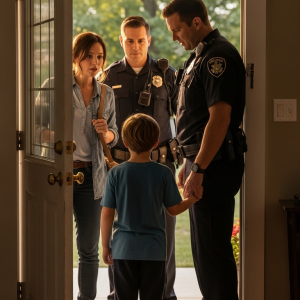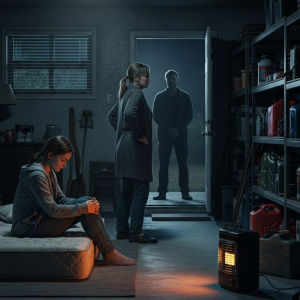It was supposed to be my birthday. I walked into a room filled with balloons, the scent of sugar and melting wax, and the low thrum of a party in full swing. Everything was perfect. But then I saw the banner, glittering arrogantly above the fireplace: ‘Congratulations, Amanda!’
It wasn’t my party. It was my sister’s surprise graduation celebration. So, I left as quietly as I had arrived and set a different plan in motion. Two weeks later, my sister would be the one calling me, her voice choked with tears, from a police station interrogation room.
For one perfect, foolish moment, I had actually let myself believe it was for me. The music, the streamers, the rich aroma of chocolate cake—I thought my family, who had forgotten my birthday three years in a row, had finally remembered I existed.
People actually turned and clapped when I walked in. I almost laughed out loud; it felt like a scene from a movie. For three blissful seconds, I lived in a fantasy world where I was not the afterthought, but the main event. Then the banner caught the light, and the fantasy shattered.
“Congratulations, Amanda!” in huge, shimmering gold letters. My sister’s name, in a cursive font that seemed to mock me. Just like that, the warmth in the room turned to ice. Reality slammed back into place, hard and cold.
Amanda strutted into the room, wearing a tight white dress under her cap and gown, already posing for photos. “You guys!” she squealed, feigning surprise. “I think I’m going to cry! This is everything!” She doesn’t cry. Not unless there’s a camera or a credit card involved.
I stood off to the side, still clutching the gift bag I’d brought for my dad to give me from them. I’d learned years ago to provide my own presents to avoid the sting of their forgetfulness. I was used to being an afterthought. I wasn’t used to being the centerpiece of a prank this cruel.
I found my mother in the kitchen and asked, as calmly as I could, if they had intentionally planned this on my birthday. She looked at me with a vague, almost bored confusion, then a flicker of guilt, quickly replaced by annoyance.
“We thought we’d celebrate both,” she said dismissively. “You don’t like a lot of attention anyway, right?”
Then my dad chimed in from the couch, oblivious as ever. “We ordered your favorite cake, see? We didn’t forget!” He pointed to a three-tiered monstrosity adorned with a sugar-printed photo of Amanda’s smiling face. “Congratulations Amanda!” was piped in cold, blue icing. It really screamed “Happy Birthday, Oliver.”
Amanda finally noticed me. “Oh, you’re here!” she said, blowing a kiss in my direction. “You didn’t tell me you were coming. That’s cool, though. We can just share the party… unless that makes it weird for you?” She said it as if I were a stranger who’d wandered in off the street.
“Oh, and hope you don’t mind,” she added with a dazzlingly fake smile. “We kind of used your credit card for the cake. It was just easier.”
That’s when my own smile cracked. I pulled out my phone and checked my banking app. It wasn’t just the cake. There was a $900 catering charge, a $500 venue deposit from three days ago, and a $200 floral order with the note: For Amanda’s Big Day.
A hot flush of shame and rage crept up my neck. Not the loud, explosive kind of anger, but the quiet, suffocating kind. I didn’t make a scene. I just turned around and walked out. I think someone asked where I was going. I’m pretty sure I heard Amanda say, “Are you seriously going to be dramatic about this?”
I didn’t answer. I wasn’t being dramatic. I was done. They thought I’d sulk and get over it. What I actually did was go to the authorities.
The first time I realized my sister could get away with anything, she was six and I was eight. She’d taken a twenty-dollar bill from Mom’s purse, and I found it tucked away in her Barbie Dreamhouse. When I told our parents, Amanda burst into perfect, camera-ready tears and pointed a trembling finger at me. “He made me do it!”
I was grounded for two weeks. Amanda got ice cream because she was “clearly distressed.” That was the beginning, or at least the first time I remember realizing the scoreboard in our house would never be balanced. Back then, I thought maybe it would even out when we were older, that eventually, people would see through her act.
They didn’t. Because Amanda didn’t grow out of that phase; she perfected it. And my parents? They applauded every single performance. Growing up, Amanda always had an audience. Her entire personality was a stage play: the perfect smile, the perfect hair, the perfect, tearful apologies that were followed by zero consequences.
If I got an A- on a test, my parents would say, “Next time, aim higher.” If Amanda got a C+, it was, “She’s doing her best, she’s under so much pressure.” She once “borrowed” my laptop for a project and returned it with a cracked screen and five missing keys. When I told her she had to pay for the repair, she just rolled her eyes and said, “I’m literally a student. You have a job. Don’t be so selfish.”
She said it like I was being unreasonable for not wanting to sponsor her casual destruction. But Amanda never had to ask. Amanda just took. My parents called it love. I called it a trip to Italy they paid for, an apartment down payment they covered, and a series of “emergencies” that always seemed to coincide with a new handbag she wanted.
I paid for my own college, every single cent. I took on two jobs and ate more instant noodles than I care to remember. Amanda, meanwhile, got a fully-funded degree and a monthly allowance so she could “focus on her studies.” I wasn’t bitter, not at first. I was just exhausted. But I told myself, you’re the older brother, you’re supposed to sacrifice.
Then came the medical lie. A year ago, she called me late one night, voice shaking, sniffling—a true masterpiece performance. She said she needed $1,800 for a specialist, told me not to tell Mom and Dad because she was scared, and that it was probably nothing serious. I wired the money within the hour.
Two weeks later, she posted a series of photos from a “healing retreat” in Bali. Yoga on the beach, crystal therapy, a villa that cost $600 a night. When I confronted her, she just blinked at me. “I was having an emotional crisis,” she’d said. “You don’t understand how draining school has been.”
My parents’ reaction? “Let it go, Oliver. Amanda has always been sensitive.”
So I didn’t yell. I just created distance, quietly and strategically. I changed my passwords, removed my cards from shared delivery apps, and made sure she couldn’t access anything she hadn’t earned. Apparently, however, she had one more trick up her sleeve. An old credit card I’d forgotten to cancel, one still linked to the account from last year’s Thanksgiving groceries.
Apparently, using my money for Amanda’s party wasn’t taking what wasn’t hers. It was just… convenient. I should have expected it, but it still hit me in the gut. Hard.
After I left the party, I sat in my car in silence for a long time, not crying, just processing. It wasn’t even about the money, though that was a significant blow. It was the crushing realization that no matter how old we got, nothing had changed. I was still the backup plan, the afterthought, the walking wallet.
My mom called, a series of frantic, missed calls. Then my dad, his voice laced with a confusion that would have been funny if it wasn’t so pathetic. “Son, you’re making your mother upset. You know how she gets. Just come back inside.”
Then, a text from Amanda. “You’re really going to ruin my graduation over this?”
That was the line. The final, invisible boundary she had so casually stomped over. I started the car. I didn’t go back to the party. I went to the police station. I explained the situation calmly, laid out the receipts, the bank statements, the text messages. The officer listened patiently, his expression shifting from bored to intrigued. He told me what I had was a clear case of financial misrepresentation.
The next two weeks were a storm of voicemails and angry texts. My mom, my dad, even my aunt who I hadn’t spoken to in five years, all of them telling me I was tearing the family apart. My favorite was from my dad: “Your mother is very disappointed, Oliver. You’re strong. You’re supposed to rise above things like this.”
I didn’t answer any of them. I woke up one morning to a string of missed calls and a final, desperate voicemail from Amanda. Her voice was cracking. “I’m at the police station,” she sobbed. “They said there’s a report… a fraud report. With your name on it. Oliver, what did you do?”
I took a deep breath. “It’s not what I did, Amanda. It’s what you did.” I could hear her sharp intake of breath, the panic finally setting in.
“But you can’t be serious!” she cried. “This could go on my record! I won’t get the job at the marketing firm! You’re ruining my life over a party!”
“No,” I said, my voice colder than I’d ever heard it. “You’re ruining your own life. And I’m just not paying for it anymore.”
She was offered a deal: repay the full amount, complete 100 hours of community service, and enroll in a financial accountability workshop. In return, no charges, no permanent record. All she had to do was admit fault. She refused, of course. Said it was “humiliating” and would make her “look guilty.” The investigating officer’s reply was simple: “You are guilty.”
She eventually cracked, but not because she developed a conscience. The marketing firm she’d been interviewing with rescinded their job offer after the background check flagged the police report. That’s what it took. Not remorse, but consequences. Amanda is now working part-time at a pet supply store and living back in my parents’ house. I hear the tantrums are epic.
Last week, my mom called. Her voice was soft, like she was trying to charm a snake. “Amanda is so devastated. This misunderstanding has ruined everything. I know you’re hurt, but this family has been through enough. Isn’t it time we put this behind us?”
“Did Amanda tell you to call me?” I asked. Silence. “This isn’t a misunderstanding, Mom. It’s a pattern. And I’m not playing my part anymore.”
“But she’s your sister!”
“And that’s a fact, not an excuse.” I hung up.
Last night, Amanda sent one final text. “I hope you’re happy. You won.”
The truth is, I don’t feel like I’ve won anything. There’s no joy in this, no satisfaction. But standing on the balcony of my new apartment, in a new city, there is a quiet I haven’t felt in a very long time. A stillness. The silence of a stolen future finally being reclaimed as my own. And for the first time, that feels like enough.
The message from my father was somehow worse than my mother’s rage. He left a voicemail, his voice calm and sorrowful, the way he always sounded when he was trying to smooth things over without actually taking a stand. “Oliver, your mother is beside herself. I don’t think you understand the damage this is causing. This isn’t how our family handles things. We keep it in the house.”
His words were a perfect summary of my childhood: keep the pain inside, where no one can see it. He wasn’t defending Amanda’s actions; he was defending the family’s silence, the unspoken contract that her happiness was paramount, and my role was to absorb the cost. That was the call that made me finally start blocking their numbers.
Two weeks later, after the job offer was rescinded and Amanda’s future suddenly looked less golden, my mother called from a number I didn’t recognize. I answered, and her voice, stripped of its usual authority, was thin and pleading. It was a new tactic, and for a moment, it almost worked.
“Oliver, please,” she began, the fake tremor in her voice a masterpiece of manipulation. “Amanda is devastated. Her life is ruined. All because of a silly misunderstanding. After everything we’ve done for you, how can you be so cruel?”
“What you’ve done for me?” I asked, the words feeling foreign in my mouth. “You mean the years of being told I was ‘too sensitive’ for wanting my birthday acknowledged? Or the college loans I’m still paying off while you funded her ‘European experience’? This wasn’t a misunderstanding, Mom. It was theft.”
“You always have to be so dramatic,” she snapped, the victim act dissolving into familiar venom. “Your sister has a delicate nature. She’s not built for the world the way you are. She makes mistakes. A family is supposed to forgive. They’re supposed to help.”
I looked out my apartment window at the city lights, a sea of strangers who knew nothing of my family’s twisted scoreboard. A profound sadness washed over me, colder and deeper than the anger. It was the grief for the family I should have had. “Help is a two-way street, Mom. You just never bothered to look in my direction.”
I ended the call before she could reply, my hand steady. It wasn’t about winning anymore. It was about ending the game.
Last night, Amanda sent one final text. “I hope you’re happy. You won.”
The truth is, I don’t feel like I’ve won anything. There’s no trophy for escaping a burning building. You just feel the relief of clean air in your lungs. Her idea of “winning” was the old family scorecard, where one person’s gain had to be another’s loss. But I wasn’t playing that game anymore.
My victory isn’t about her loss; it’s about my peace. It’s the quiet morning coffee I can now enjoy without my phone buzzing with a new, manufactured crisis. It’s the freedom of planning my own birthday, a small dinner with a few real friends, knowing it won’t be hijacked or forgotten. It’s the silence that is no longer heavy with unspoken resentment, but light with possibility.
I’ve lost a family, yes. But maybe I never really had one to begin with. What I had was a role I was born into, a part to play in the long-running drama of ‘The Amazing Amanda’. I have stepped off the stage, and for the first time, the silence that follows feels, finally, like my own. And that is more than enough.




